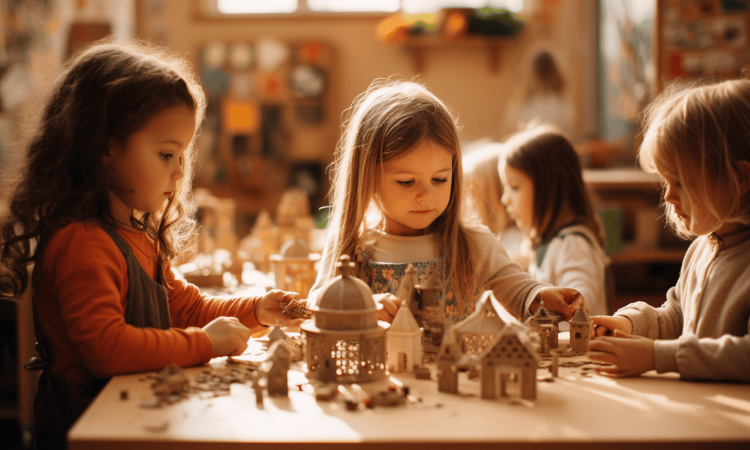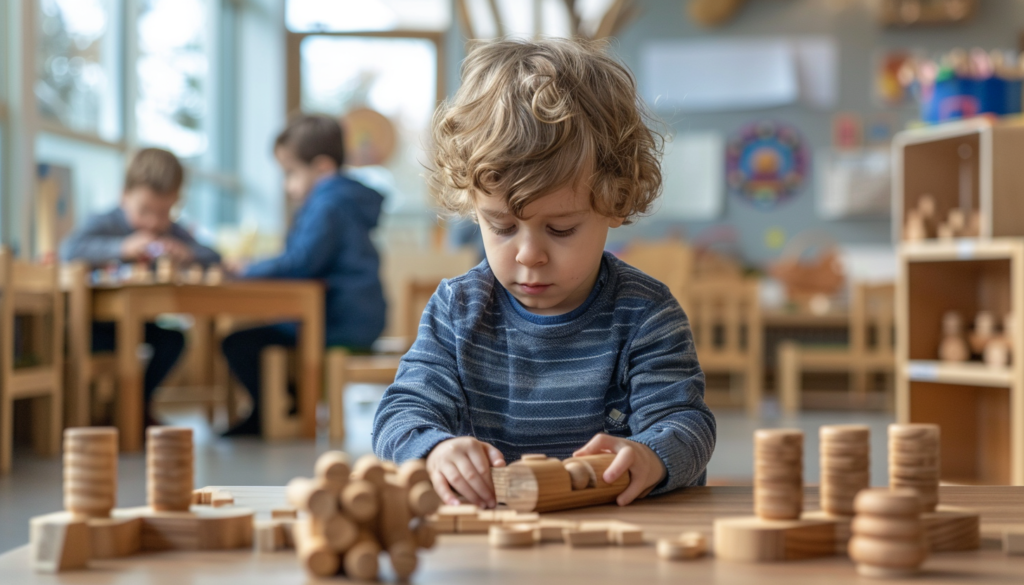GiftCurious participates in affiliate marketing programs, including Amazon Associates. See our disclosures.

Are Montessori gifts worth it?
Do the benefits of Montessori products justify the expense?

What are Montessori gifts?
Montessori gifts are products that align with the principles of Montessori education, developed by Maria Montessori over a century ago. These gifts follow her teaching philosophy and have design elements that encourage independence, skill development, and problem-solving.
It may be fair to say Montessori has grown from what was primarily an educational philosophy into a style of parenting. Montessori-aligned products support these choices by encouraging sensory exploration, development of motor skills as well as some practical skills.
In our review of Montessori-friendly gifts, we break them up into seven main buckets:
- Sensory experiences
- Skill development activities
- Practical materials
- Objects for the learning environment
- Animal figures
- Music
- Arts and crafts
Across the board, you’ll see a strong preference for products that use raw and natural materials like wood, metal, or felt—textures found in our natural environment.
Do Montessori toys really make a difference?
Let’s start with some important facts. While Dr. Montessori developed several learning materials, she didn’t talk about them as “toys.” She developed a set of interactive objects with specific goals like helping kids learn the concept of dimension or color, or support academic learning.
Therefore, when we talk about toys, it may be more accurate to call them “Montessori-aligned” or “Montessori-themed.” As for the question of, “do Montessori-aligned toys make a difference,” I’ll try to present a balanced perspective.
Negatives
On the one hand, despite Montessori method’s 100+ year history, the number of extensive, independent assessments of its effectiveness is surprisingly low. So, if you’re looking for a seal of approval that says “this toy will have direct cognitive and developmental benefits,” you may find a whole lot of marketing instead.
Positives
At the same time, an often cited benefit of Montessori education is improved levels of concentration among children. Dr. Montessori found that, with the right activities, even very young kids could undertake repetitive tasks without distraction for long periods. Several Montessori-themed toys are designed to promote focus and concentration by developing skills one at a time.
Research also suggests freedom and choice within a carefully ordered structure are linked to improved psychological and learning outcomes. Montessori toys that present things in orderly sequences help kids fine tune their senses.

Why are Montessori toys expensive?
There are half a dozen reasons that lead to higher costs for Montessori products. These include the use of high-quality materials, quality of craftsmanship, expertise required to create educational products, ethical/sustainable manufacturing practices, and low production volume.
Curious to hear how these factors drive up costs? Check out our analysis of why Montessori gifts are so expensive.
Montessori gifts: Are they worth your dollar?
“The goal of early childhood education should be to activate the child’s own natural desire to learn.” These words from Dr. Montessori herself suggest activities and toys can be worth the investment if they tap into a child’s natural desire to learn.
The problem these days is there is no standard for what products qualify as Montessori, so you’ll find a lot of products that carry the label despite being completely at odds with the learning philosophy.
Here are six factors to help you decide if Montessori gifts are worth your money:
1. Design
When deciding whether to splurge on Montessori gifts, consider the originality of their design compared to the cost. Some Montessori toys are expertly designed to promote problem-solving, critical thinking, and fine motor skills. Others look like every other toy from Walmart—minus the bright colors. Evaluate each item to see what makes it Montessori-aligned.
2. Durability
If you have multiple children or hope to get several years out of your Montessori toys, that may justify the higher upfront expense. Artfully-crafted gifts can even pass down from one generation to the next, which is hard to say for most gifts made of plastic.
3. Choice of materials
Consider how badly you’d like to avoid brightly colored, plastic toys in favor of Montessori toys that tend to favor natural materials like wood, metal, and cotton. The materials play a role in building a connection with nature and natural objects.
4. Sustainability
Having non-toxic finishes and materials is essential for safety. Beyond that, Montessori toys often feature materials such as 100% organic cotton or sustainable harvested wood. These are truly great for the planet. However, if your goal is strictly to promote a natural desire to learn, these features don’t necessarily make the products more educational.
5. Child's age
While Montessori gifts can be beneficial for children of all ages, their impact may vary depending on the development stage of the child. Infants and toddlers may benefit from sensory exploration and fine motor skill development, while older kids may get more out of complex problem-solving and creative activities.
6. Cost
Cost is always part of the calculation. How do you decide between conventionally-grown vs organic produce? In our family, we prefer organic fruits and veggies, but at a certain price difference, we may decide to pass. That logic can be applied to Montessori gifts as well. Look at all your options and see if the price differential justifies all the extra benefits you’re getting.
What are alternatives to buying Montessori gifts?
Spending lots of your hard earned money isn’t the only way to get your hands on Montessori products. Here are some practical alternatives:
- Buy second hand. Cheaper and better for the environment.
- DIY it. If you have the time and skill, consider crafting your own toys.
- Find a community. You may meet people whose kids have outgrown their Montessori toys and are ready to part with them (or let you borrow).
- Buy fewer (but higher quality) items. Be mindful about what you’re buying and only splurge for the best stuff when you’re convinced it has a home in your child’s learning environment.
The wrap up: Are Montessori gifts worth the price tag?
The answers boils down to a combination of credible research and a parent’s judgment. If you’re looking for a direct connection between Montessori gifts and having smarter kids, you may find that is hard to prove. However, based on what we know about childhood development, investing in Montessori gifts can be a meaningful way to support a child’s development and foster a lifelong love of learning.
Sources:
https://journals.ku.edu/jmr/article/view/7586/7762
https://www.nature.com/articles/s41539-017-0012-7
http://faculty.tamuc.edu/jthompson/Montessori/documents/NinePrinciplesOLD.pdf
Lillard, Angeline Stoll. (2016). Montessori: The Science Behind the Genius

